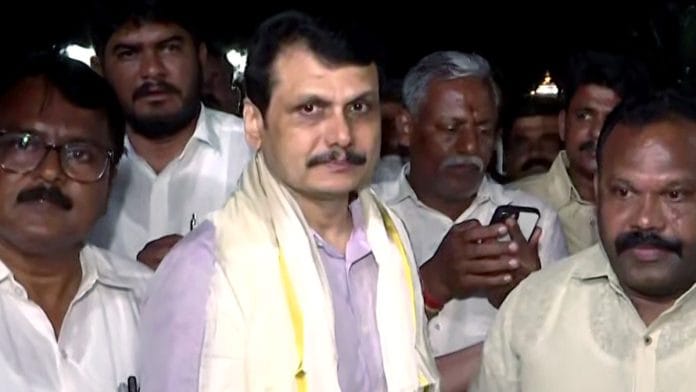New Delhi: Nearly two months after it was passed, an order of a trial court in Chennai which allowed Tamil Nadu Police Crime Branch to club all corruption cases, arising out of the ‘cash-for-jobs’ scam, against state minister Senthil Balaji into one chargesheet, is yet to be formally given to complainants in the case, the Supreme Court was told Monday.
In the absence of a formal order, complainants said they were unable to challenge the special MP/MLA court’s 1 October decision that merged four cases into criminal case (CC) number 24 of 2021 that was originally related to hiring of junior engineers.
With the trial court order, the number of accused in CC 24/2021 skyrocketed, from 47 to 2,202—making the trial’s completion a herculean task. Moreover, it widened the ambit of the criminal case to cover allegations of corruption and irregularities with regards to other hirings, and this, complainants claimed, has been done to delay the trial.
The complainants estimate that it would take about 150 years to examine all 500 witnesses and conclude the trial.
The submission surprised the bench of Justice Abhay S. Oka, which, during an earlier round of hearing, had asked complainants to file a substantive appeal against the 1 October order. When informed that the order was not provided to them despite several requests, the bench Monday directed the state to ensure a copy is supplied to complainants so that they can assail it.
In May 2023, the top court had paved the way for the Tamil Nadu Crime Branch to investigate Balaji. It had set aside a 2022 Madras High Court order for a fresh investigation against the minister and others in the case.
Also Read: ED’s Aircel-Maxis case, Chidambaram’s challenge & what Delhi HC said while staying trial proceedings
What is ‘cash-for-jobs’ scam
Allegations in the ‘cash-for-jobs’ scam date back to November 2014 when Senthil Balaji was transport minister in the then All India Anna Dravida Munnetra Kazhagam (AIADMK) government.
The complainants claim the minister’s associates took cash from aspirants while promising them jobs in the Metropolitan Transport Corporation. These jobs were for the post of reserve crew drivers, crew conductors, junior tradesmen (JTM), junior assistants (JA) and junior engineers.
While jobs were allegedly given to those who paid up, some were kept pending.
Investigation was conducted on the basis of an FIR registered in 2015, and a chargesheet filed related to the specific allegation made in it that accused Senthil Balaji of accepting bribes in exchange for a conductor’s job.
During the investigation of this FIR, police unearthed the commission of crime in the appointment of assistant engineers, junior tradesman, conductors, drivers and junior engineers. The police went on to file CC number 24/2021 in connection with the appointment of junior engineers.
Meanwhile, the Enforcement Directorate (ED), which initiated its probe against the minister on the basis of the local police case, arrested Senthil Balaji in June 2023 who then approached the Supreme Court for bail. After much back-and-forth, the top court granted him bail in September this year, while observing that a prima facie case was made out against him.
During the same period, Tamil Nadu police prepared four supplementary chargesheets against Balaji. Three of them were given to the special court in August and September 2023 and the last submitted in September 2024.
‘Each transaction was for a separate post’
Apprehending the prosecution may move the trial court to club the cases with CC 24/2021, a civil society organisation (Anti-Corruption Movement) approached the top court with a plea to stall it. Filed on 24 September, the application submitted that each supplementary chargesheet dealt with a separate offence, even if the modus operandi adopted in each was the same.
Advocate Pranav Sachdeva, counsel for the Anti-Corruption Movement, told ThePrint that clubbing of trials is an exception. “Each transaction was for a separate post. Therefore, merging was not possible,” he explained.
Though the court on 30 September issued notice on the Anti-Corruption Movement’s application, the trial court on 1 October allowed the clubbing of all the cases into one chargesheet. When the matter was heard again in the top court, the latter was apprised about the trial court order following which Sachdeva’s client was told to withdraw its application and file a proper appeal challenging the said direction by the subordinate court.
On Monday, Anti-Corruption Movement complained about the non-availability of the trial court order. Another complainant against Senthil Balaji, Y. Balaji, also alleged that the trial court order was not even uploaded on the e-court website where all trial court orders are updated.
The Supreme Court’s May 2023 decision in the Senthil Balaji case came on Y. Balaji’s petition that challenged the Madras High Court order for a fresh investigation against the minister and others in the case.
Balaji’s counsel Balaji Srinivasan explained that CC 24/2021 chargesheet deals with a standalone case, which is an open-and-shut one considering the ample evidence gathered in the case.
“This is about corruption in hiring of junior engineers. To club the supplementary chargesheets that related to hiring of conductors, drivers, junior tradesmen and assistant engineers with CC 24/2021 is to not just to derail the trial in this case, but is also an attempt to dilute it,” Srinivasan said.
Sachdeva told ThePrint the supplementary chargesheet names not just bribe-givers as accused, but also those who got jobs. “Every defence lawyer has right to cross-examine. Given that there are more than 2,000 accused and around 500 witnesses, this trial will take 150 years to end,” he said.
(Edited by Amrtansh Arora)







In the first line of the 5th paragraph from the last, “anti corruption movement” is mistakenly represented as “anti India movement”. The article may be kindly correct.